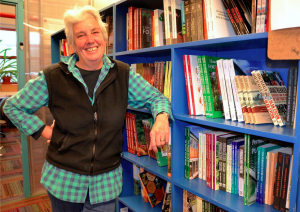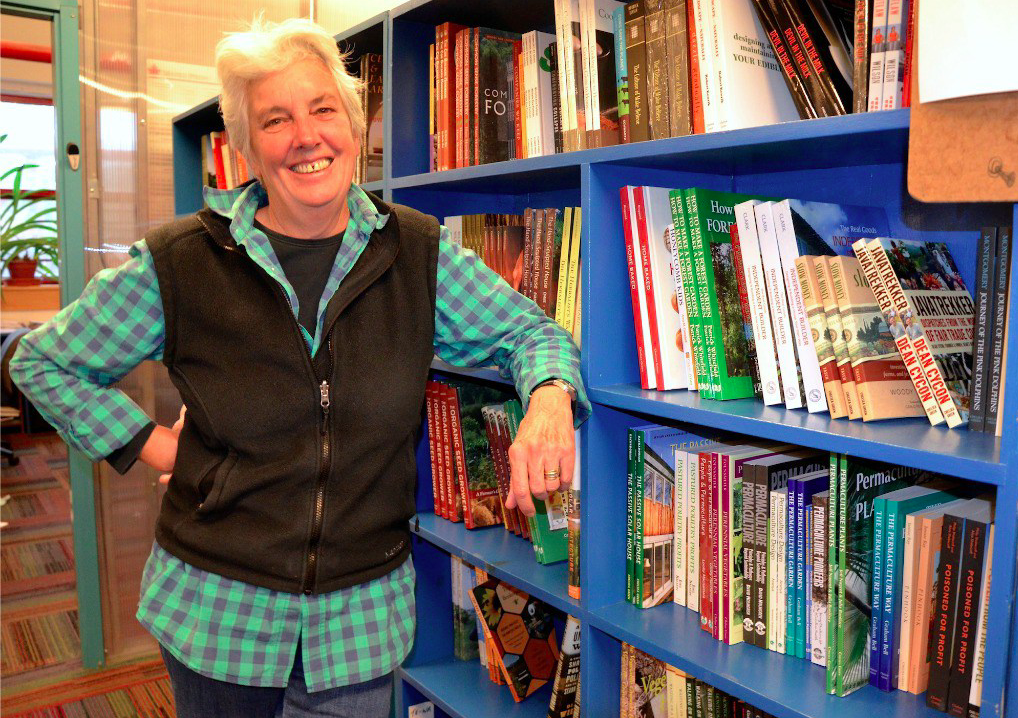By Alex FitzGerald, Jennifer Joseph, Jennifer Shelbo and Katie Ellman
Book publishing is a $28 billion industry in the United States. While there has been growth in e-books and audio books, the printed word is still the way most Americans read their books. However, it is also a resource intensive industry that produces approximately 12.4 million metric tons of carbon annually.

Enter Chelsea Green Publishing. Founded in 1984 by Ian and Margo Baldwin, Chelsea Green is recognized as a leading publisher of books on the politics and practice of sustainable living. It produces foundational works on topics ranging from regenerative agriculture to local economies, to green building and renewable energy.
Chelsea Green also leads the industry with its environmental practices, printing 95 percent of its books on chlorine-free recycled paper and minimizing its carbon footprint by working exclusively with North American, rather than overseas, printers. It includes an environmental impact statement in each of its books. In 2012, Chelsea Green became an employee-owned company.
Last month, students from the Bard MBA in Sustainability talked with Margo Baldwin, Chelsea Green Co-Founder, President and Publisher, about the company’s mission and impact.
The following Q&A is an edited excerpt from the Bard MBA’s April 7th Sustainable Business Fridays podcast. Sustainable Business Fridays brings together students in Bard’s MBA in Sustainability program with leaders in business, sustainability and social entrepreneurship.
Listen to this interview and others on the Bard MBA Sustainable Business Fridays podcast on an Apple or Android device.
Bard MBA: Chelsea Green Publishing is regarded as the leading publisher of books on sustainable living. How did you build the company?
The company got started almost 33 years ago. We really didn’t have this idea that we were going to do a publishing company solely devoted to sustainability, so we grew into that mission a little bit. When we started, we just wanted to do good books, broadly defined. We were pretty eclectic, but the realities of running a small publishing company and understanding that you need to be niched if you are going to survive got us focused on the kind of books we really wanted to do.
Once we figured out that it was going to be focused on the environment and sustainable living—which included a lot of practical, how-to books—our publishing program got a lot better defined. We started to build up what is called our backlist, books that continue to sell year after year. It wasn’t an easy thing to do and it took a long time for us to become a stable company. But I think in the end we built up something pretty substantial that has affected a lot of people. We feel good about that.
Bard MBA: What has been one of the most fulfilling aspects of your role at Chelsea Green?
Every time a new book rolls out that you feel has potential to change the conversation or change the world, it is extremely fulfilling. The thing about book publishing is that you’re not just making lots of things that are the same. Each book is different and each author is different, so it creates a lot of interesting relationships.
It also calls for intense creative work to not only get the book edited and produced and published, but out into the world and successfully marketed. Then, you feel like, “Oh, we did a good job on this book, and now it’s off and running. The author’s happy and we’re happy. It’s having an impact and we’re affecting the culture.”
Conversely, when you put a lot of time and energy into a book and for whatever reason it doesn’t work, it can be extremely frustrating. But it’s never boring because every book is different. You are in a creative industry, and you have to remember that.
Bard MBA: Do you feel that the employee-owned model has been successful for you?
We are very glad we did it, but we feel like we’re just beginning stages. It’s really going to depend on how this works out over time.
As a pretty small company, it’s quite a complex thing to do and to manage. It stretches our capacity on an administrative level just to make sure we are doing everything properly. There are a lot of legal and accounting complexities around it, which is why most ESOPs [employee stock ownership plans] are larger companies. It is treated legally like a retirement plan, so the shares of the company are held in trust on behalf of the employees in individual accounts that build up or decline over time based on the share price of the company.
Because it hasn’t to a degree really changed the management structure, it is sometimes hard for employees to understand what that ownership means. You have to work hard at building up the culture of ownership, and that’s not so easy to do. Employees have a hard time wrapping their heads around the fact that being an owner is different than just being an employee.
Bard MBA: Are there positive ways that becoming employee-owned has further embedded the shared values of the company?
It’s kind of a subtle thing. If you attract the right employees, they want to stick around because they are getting a good benefit. They do feel as if they have a stake in the company’s future.
It just takes a lot of work to maintain and grow that understanding. If you look at our neighbor, King Arthur Flour, which is a much bigger company, they have whole committees, departments, and specialized people who are devoted to making it happen. When you are in a very small company, it is harder because you don’t have the personnel to devote to it. You have to let it evolve and try to insert it into how you talk about the company, how you attract new people, and your expectations of those employees over time.
But there is growing awareness that it is great to be an employee-owned company, and our employees are proud of what they are doing. On the other hand, sometimes our younger employees don’t really believe that anything that is put aside for their retirement will actually materialize. They can’t imagine thirty or forty years in the future when they are going to be able to cash in on that. So the age issue needs some work, but I think that is true for every employee-owned company.
Bard MBA: That’s probably true for any employee anywhere. What you need to do to be a responsible steward of your own future seems so far off when you are young.
Yes, it does. And younger employees tend to have less cash, so their attitude is “Well, that sounds great, but just give me the cash now—I need it to pay my rent.” There is that aspect, too.
Bard MBA: What is one message you want to put out there to people either looking to make change or wanting to be part of a movement?
Just do it! It depends on what your passion is around, whether it’s starting a new business or being an activist. You just have to find an organization that’s doing it and jump in.
If you can’t find someone to hire you, just start it yourself. It’s easier than you think, even though it’s really hard work. First, you have to follow what motivates and inspires you—then you can figure out the specifics.
You are told probably in your schoolwork that you need to do a plan and do a P&L and have some money. But a lot of things get started on a very little small level and then grow. If you’ve got a good idea, you should follow it and see if you can make it work.
Young people sometimes think they have to get hired when in fact you don’t. You just need to get going. And sometimes that means volunteering and then that work turns into a job. It sometimes means starting a small business. Don’t be done in by the barriers that seem to get erected.
